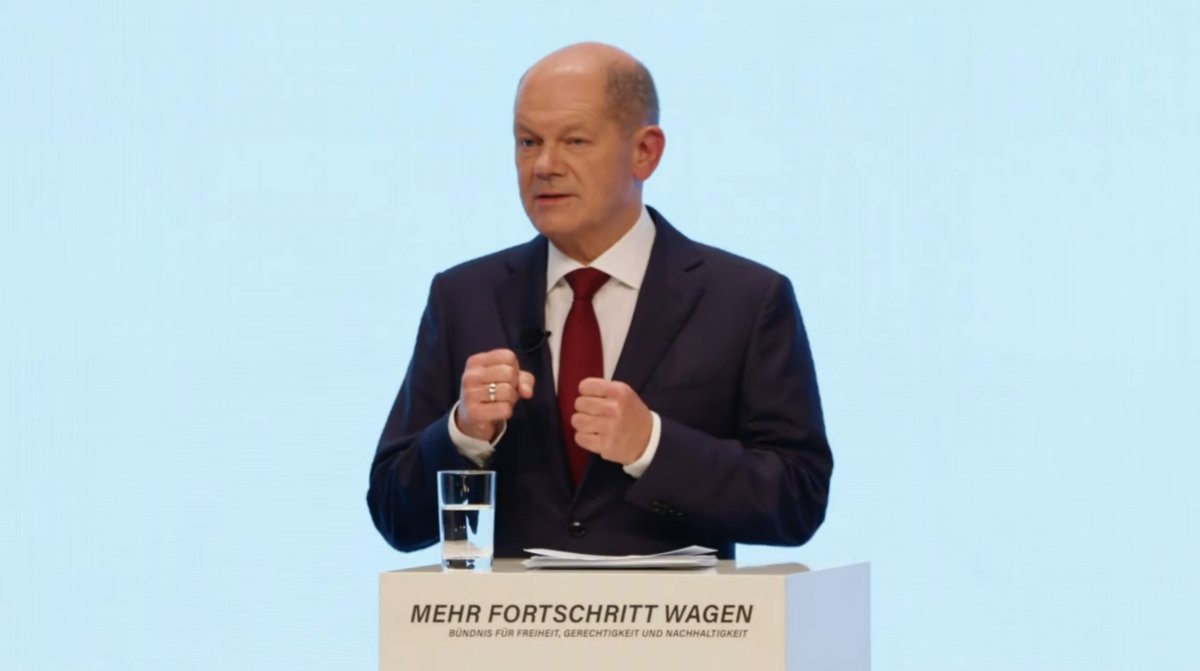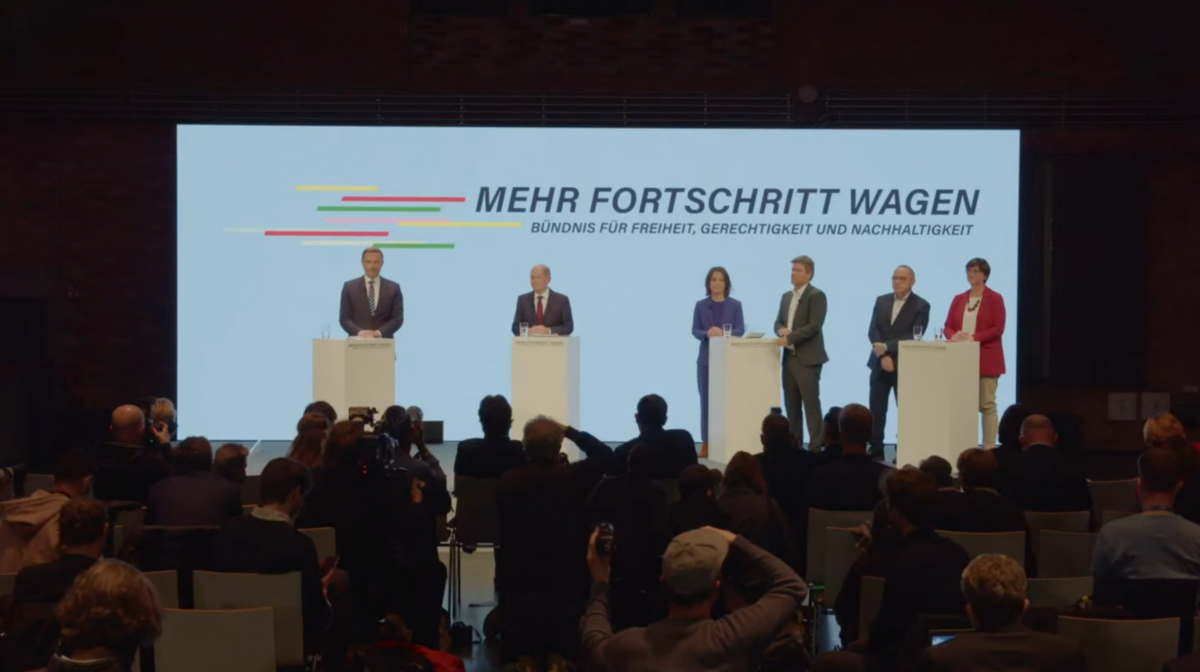Next German government aims for coal exit in 2030 in bid to get on 1.5 degree path

Germany's likely new government has agreed to speed up the country's coal exit and accelerate the rollout of renewable power to get the country on track for climate neutrality. "We will align our climate, energy and economic policies nationally, in Europe and internationally with the 1.5 degree path and activate the potential at all levels of government," states the coalition agreement between Social Democrats (SPD), Greens, and pro-business Free Democrats (FDP). "With ambition and perseverance, we are making the country a pioneer in climate protection," SPD chancellor candidate Olaf Scholz said during the treaty's presentation in Berlin . He added that "modernisation won't be for free – we will invest massively so Germany can stay a world leader."
Germany plans to become climate-neutral by 2045, but the measures implemented by the outgoing government, a coalition between chancellor Angela Merkel's Conservatives and the SPD, are insufficient to reach that target. The September vote had been called a "climate election" due to the high importance many voters had given the topic. The next German government's plans also have an enormous impact on international and particularly on European climate policy and the EU Green Deal.
The 178-page document that explained the new coalition’s plans in all policy areas contained long sections on climate and energy. SPD secretary general Lars Klingbeil already during the negotiations had said climate would be “perhaps the most important point” in the treaty.
The traffic light coalition said it wants to push for a European carbon floor price for the emissions tradings system ETS and expand the mechanism to the transport and building sectors. It also aims to make Europe as a whole a lead market for green hydrogen production technologies and to launch an international Climate Club with international partners that introduces a uniform CO2 minimum price and a common carbon border adjustment mechanism for its members. Green Party co-leader Annalena Baerbock said the treaty would bring a "paradigm change" that ensures climate action from now on will be included in all branches of government "and also in our foreign and defense policy."
Scholz aims to be elected chancellor of a so-called "traffic light coalition," named after the parties' colours, in the week of 6 December. Prior to that, the Greens will invite all 120,000 party members to vote on the coalition agreement online. The SPD and the FDP will organise party conferences on 4 and 5 December, respectively, to secure their members’ backing for the agreement.
Faster rollout of renewables, 15 million e-cars, carbon floor price
"Reaching climate targets will require an accelerated exit from coal power generation," the coalition treaty reads. "Ideally, this will be achieved by 2030 already." Green Party co-leader Robert Habeck said the measures agreed by the three parties would put Germany on an emissions reduction path compatible with the Paris Climate Agreement's target of limiting global warming to 1.5 degrees Celsius. The coalition treaty's "core" principle would be to reconcile prosperity with climate action, he argued.
"We have decided against setting higher climate targets in the coalition agreement, but rather formulated concrete measures," Habeck said. The three parties said they aim to cover 80 percent of the country's power demand with renewables by 2030, a significant increase from the current target of 65 percent. "Renewables are no longer an addition to but will rather have to carry our supply security," Habeck said.
FDP leader Christian Lindner, who is likely to become new finance minister, said "no other industrialised country will make efforts in climate action as great as ours, this is the most ambitious programme to date" and the government would make sure that it is sufficiently funded. At the same time, Germany would remain "an advocate of prudent financial policy," Lindner added.
The parties also rejected calls for postponing the end of nuclear power plants. "We will stick to the nuclear exit," their coalition agreement says. To help the country's famed industry to lower emissions, the future government plans to use new instruments, such as carbon contracts for difference.
The coalition partners also said they will consider a national carbon floor price of 60 euros if the price in the EU emissions trading system falls below that limit. In the transport sector, they want to achieve a fast transition to low-emission mobility. "Our target is at least 15 million fully electric cars by 2030," the treaty says.
The prospective new government also agreed on considerable changes to the government architecture to implement its climate agenda. The parties plan to create a novel climate ministry that merges the energy and industry departments of the economy ministry with the environment ministry's climate department.
Business and NGOs react cautiously positive but doubts about 1.5 degree-conformity remain
Initial reactions to the treaty by business and civil society groups were cautiously positive, with especially the renewable energy industry welcoming increased expansion plans for wind power, solar power and other technologies. Others were sceptical whether the policies announced would really be sufficient to put Germany on a 1.5 degree-path.
Solar industry lobby group BSW Solar called the treaty "a solid launch pad for the successful solarisation of Germany's energy supply," urging the prospective government to remove market barriers quickly. "Citizens and companies are willing to invest and the solar industry is ready to act," BSW Solar head Carsten Körnig said.
The German Wind Energy Association (BWE) said the treaty showed that the three parties are serious about addressing climate action and voiced the hope that "the time of standstill and stagnation is over," after several years of below-target expansion figures for the technology. "Many measures need to be implemented before the parliament's summer break next year," BWE head Hermann Albers said.
Railway NGO Allianz pro Schiene said "this is the first time a coalition clearly gives railways a priority over roads in transport sector investments," whereas Environmental Action Germany (DUH) argued "the car companies' handwriting cannot be overlooked" in the treaty. "Germany will remain the country for speeding, ever bigger SUV-city tanks and state-sponsored climate killer company cars," said DUH head Jürgen Resch, adding that his organisation would continue to litigate also against the new government's transport policy.
NGO Friends of the Earth Germany (BUND) said it doubts that the agreements reached will be enough to keep Germany's climate policy compatible with the 1.5-degree limit. "In this respect, we are critical of the measures in the transport sector, the gas infrastructure and the reduction of environmentally harmful subsidies," said the BUND's Olaf Bandt.


